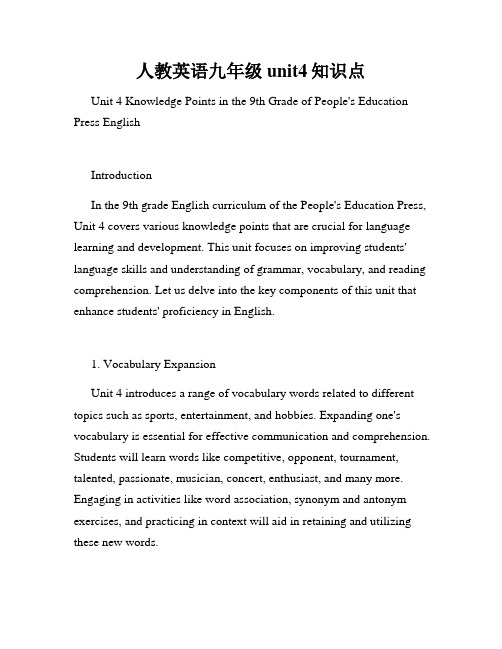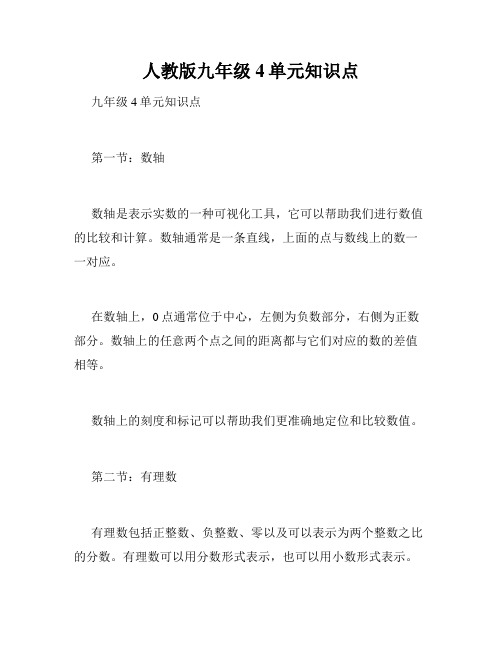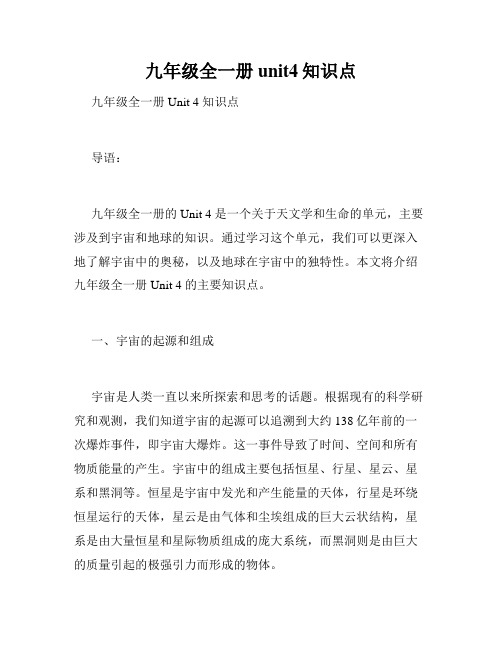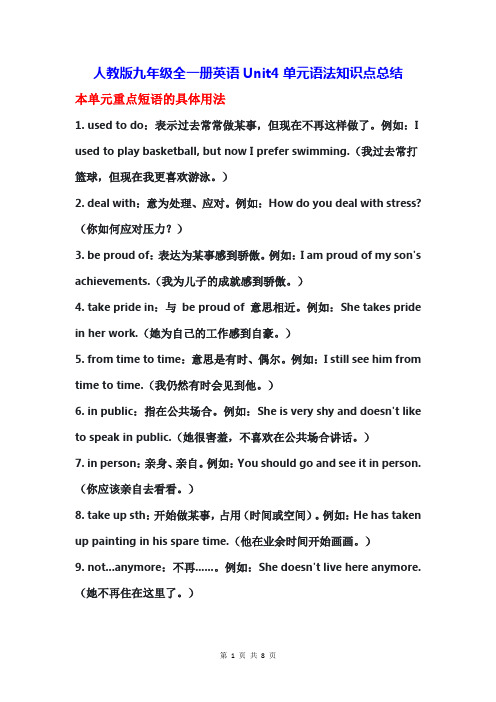人教版九年级全一册第四单元知识点
人教英语九年级unit4知识点

人教英语九年级unit4知识点Unit 4 Knowledge Points in the 9th Grade of People's Education Press EnglishIntroductionIn the 9th grade English curriculum of the People's Education Press, Unit 4 covers various knowledge points that are crucial for language learning and development. This unit focuses on improving students' language skills and understanding of grammar, vocabulary, and reading comprehension. Let us delve into the key components of this unit that enhance students' proficiency in English.1. Vocabulary ExpansionUnit 4 introduces a range of vocabulary words related to different topics such as sports, entertainment, and hobbies. Expanding one's vocabulary is essential for effective communication and comprehension. Students will learn words like competitive, opponent, tournament, talented, passionate, musician, concert, enthusiast, and many more. Engaging in activities like word association, synonym and antonym exercises, and practicing in context will aid in retaining and utilizing these new words.2. GrammarGrammar plays a vital role in constructing and organizing sentences effectively. Unit 4 emphasizes the correct usage of various tenses, active and passive voice, and reported speech. Students will gain a deeper understanding of how to express actions in the past, present, and future, how to transform sentences from active to passive voice, and how to report information accurately. Practical exercises, paired or group activities, and constant practice will help students develop their grammar skills.3. Reading ComprehensionDeveloping reading comprehension skills is crucial for understanding written texts and gathering information. Unit 4 presents students with captivating passages, articles, and stories relevant to the unit's theme. Students will be encouraged to read actively, identify key details, enhance critical thinking, and infer information from the text. Questions and tasks related to the reading materials will assess students' comprehension skills and prompt them to think critically about the content.4. Listening and SpeakingEffective communication requires not only the ability to understand spoken language but also to express oneself clearly. Unit 4 introduceslistening exercises that focus on comprehension of different accents, expressions, and intonations. By practicing listening activities, students will develop their ability to follow instructions, understand dialogues, and grasp important details. Moreover, the unit provides opportunities for students to engage in discussions, express their opinions, and give presentations. These speaking tasks encourage students to improve their fluency, pronunciation, and overall speaking skills.5. WritingWriting is an essential skill that allows students to express their ideas and thoughts coherently. In Unit 4, students will enhance their writing skills by learning how to write formal and informal letters, descriptions, and summaries. Through practice, students will refine their abilities in organizing their ideas logically, using appropriate vocabulary and grammar structures, and presenting information effectively. Peer reviews and feedback from teachers will aid students in improving their writing style and accuracy.ConclusionUnit 4 of the 9th grade English curriculum from the People's Education Press encompasses crucial knowledge points that are integral to the development of students' language skills. From expanding vocabulary to mastering grammar, reading comprehension, listeningand speaking, and writing, this unit provides a comprehensive approach to language learning. By practicing and applying these knowledge points, students will enhance their overall English proficiency and confidently engage in various language-related tasks.。
人教版九年级英语全一册:Unit 4语法知识点复习提纲(全面,必备!)

人教版九年级英语全一册:Unit 4语法知识点复习提纲重点短语、重点句型知识点、交际用语、语法、单元同步书面表范文达大全Unit 4 I used to be afraid of the dark.一、重点短语Section A 1a-1c1.害怕be afraid of2.直发straight hair3.戴眼镜wear glasses4.留短发,蓄短发have short hair5.留着红色的卷发have red and curly hair6.像be likeSection A 2a-2d7.在课堂上in class8.质疑,提问ask questions9.在......上取得好成绩get good grades in=get good scores in10.在......表现出色be good in11.弹钢琴play the piano12.对......感兴趣be interested in=take an interest in=become interested in13.踢足球play soccer=play football14.在游泳队里be on a swim team15.时常,有时from time to time=sometimes16.好主意good idea=great idea17.小学同学primary school classmates18.很多,很大(程度)so much19.变红turn red20.和女孩子说话talk to/with girls21.在图书馆in the library22.好学生good student23.努力学习study hard =work hard24.取得好成绩get good grades=get good scores25.看,看一看look at=have a lookSection A 3a-3c26.从......到......from ...to...27.亚洲流行歌星Asian pop star28.学着,开始做take up29.应对,处理deal with30.在......前面(范围内)in the front of31.在......前面(范围外)in front of32.整个学校for the whole school33.好事good things34.一直,反复,总是all the time35.在学校in school36.成为大众焦点,得到极大的关注get tons of attention37.许多,太多too much38.一件坏事a good thing39.必须,不得不have to+v-原形40.担忧,担心worry about41.出现在某人面前appear to sb.42.私人时间private time43.和朋友出去闲逛hang out with friends44.放弃give up45.正常的生活normal life46.成功之路the road to success47.fight on 奋力坚持,继续作战48.许多,大量a lot of49.努力hard work50.一小部分a small number of51.许多a number of52.......的数量the number ofSection A Grammar Focus-4c53.看大量的电视watch a lot of TV54.看大量的电影watch a lot of movies55.留着卷发have curly hair56.留着直发have straight hair57.读书read a book/read books58.有关/关于欧洲历史on European history59.有关/关于美国文化on American culture60.英式英语British English61.教英国英语teach Britain English62.教美国英语teach American English63.美式英语American English64.吃大量蔬菜eat a lot of vegetables65.听listen to66.流行音乐pop music67.恐怖电影scary movies68.至少,起码at least69.做演讲,作报告give a speech/talk/report70.在公共场合in public=in public places71.高处high placesSection B 1a-1e72.P.E class体育课73.painting picture绘画,油画74.音乐课music class75.走路去上学walk to school=go to school on foot76.在足球队里be on the soccer team77.穿校服wear school uniformSection B 2a-2f78.学习非常努力work very hard79.一个小男孩a little boy80.很多时间在一起度过spend a lot of time together81.搬到,搬家move to82.找工作look for jobs83.来,到来come to84.照顾take care of=look after=care for85.对......不感兴趣become less interested in86.缺席be absent from87.旷课,缺课be absent from classes88.做决定make the decision/make a decision89.把......送到.....send sb. to...90.寄宿学校boarding school91.交朋友make friends92.和某人交朋友make friends with sb.93.离开学校leave the school94.跟某人说talk to/with sb.95.亲身,亲自in person96.到达get to97.虽然,即使even though/if98.思念,牵挂,挂念,惦记,想到think of99.为......感到骄傲/自豪take pride in=be proud of 100.此后,之后,在那之后after that101.好朋友good friends102.和某人交流have munication with 103.参加学校篮球队join the school basketball team 104.在......方面很积极/活跃become active in 105.不离左右,陪伴在某人身边be there for sb. 106.几年前a few years ago107.担忧,担心be worried about108.搬家到城市move to the city109.在家at home110.有一天one day111.改变某人的生活change one’s lifeSection B 3a-Self Check112.在过去的几年里in the last few years113.回家return home114.大多数时候/间most of the time115.考试不及格fail the examination116.赢得英语比赛,在英语比赛中获胜win the English competition117.在......中做总的自我介绍give a general self-introduction in118.工作面试a job interview119.篮球比赛basketball game120.在.......中打得很好play very well in121.对......产生影响have an influence on=be an influence on三、重点句型和知识点Section A句型1.&2.I used to be afraid of the dark.我过去怕黑。
九年级英语人教版unit4知识点

九年级英语人教版unit4知识点Unit 4 Knowledge Points in Grade Nine English of People's Education PressIntroduction:In the Grade Nine English textbook of People's Education Press, Unit 4 covers various knowledge points that are essential for students to improve their English skills. This article will explore and discuss these knowledge points in depth, allowing students to have a clearer understanding of the unit and enhance their language proficiency.1. Vocabulary:Vocabulary plays a crucial role in language learning, enabling students to express themselves accurately and fluently. In Unit 4, students will come across a wide range of vocabulary related to different topics, such as travel, sports, hobbies, and emotions. It is essential for students to familiarize themselves with these words, understand their meanings, and learn how to use them appropriately in various contexts.2. Phrases and Idioms:Besides vocabulary, the unit also introduces various phrases and idioms that can enrich students' language and make their speech more native-like. For example, expressions like "go for a walk," "hit the gym," or "break a leg" are commonly used in English and can add color to students' conversations. By incorporating these phrases and idioms into their language practice, students can enhance their speaking and writing skills effectively.3. Grammar:Grammar forms the backbone of any language, providing the structure and rules necessary for effective communication. In Unit 4, students will review and learn several grammar concepts, including verb tenses, modal verbs, and conditionals. Understanding these grammar rules is essential for constructing accurate sentences and conveying the intended meaning. Through consistent practice and application, students can master these grammar points and improve their overall language proficiency.4. Reading Comprehension:Unit 4 includes various reading passages that aim to improve students' reading comprehension skills. These passages cover a range of topics, from environmental issues to personal experiences, allowing students to expand their knowledge while developing their readingabilities. By reading extensively and actively engaging with the texts, students can improve their comprehension, vocabulary, and critical thinking skills simultaneously.5. Listening Skills:Effective listening is a fundamental skill in language learning. Unit 4 provides numerous listening exercises that enable students to sharpen their listening skills and enhance their ability to understand spoken English. These exercises may feature dialogues, interviews, or monologues, covering different accents, speeds, and levels of complexity. Through regular practice, students can gradually improve their listening comprehension and become more proficient in understanding spoken English.6. Writing Practice:In Unit 4, students have the opportunity to practice various types of writing, such as descriptive, narrative, and persuasive writing. These writing tasks encourage students to express their ideas, thoughts, and experiences in a coherent and organized manner. By paying attention to the appropriate use of vocabulary, grammar, and sentence structure, students can develop their writing skills, foster creativity, and effectively communicate their thoughts on paper.Conclusion:Unit 4 of Grade Nine English in the People's Education Press textbook covers vital knowledge points necessary for students to enhance their language skills. By thoroughly understanding and practicing vocabulary, phrases, grammar, reading comprehension, listening, and writing, students can become more confident and proficient users of the English language. Regular and consistent practice, both in and outside the classroom, is key to achieving fluency and success in English communication.。
人教版九年级4单元知识点

人教版九年级4单元知识点九年级4单元知识点第一节:数轴数轴是表示实数的一种可视化工具,它可以帮助我们进行数值的比较和计算。
数轴通常是一条直线,上面的点与数线上的数一一对应。
在数轴上,0点通常位于中心,左侧为负数部分,右侧为正数部分。
数轴上的任意两个点之间的距离都与它们对应的数的差值相等。
数轴上的刻度和标记可以帮助我们更准确地定位和比较数值。
第二节:有理数有理数包括正整数、负整数、零以及可以表示为两个整数之比的分数。
有理数可以用分数形式表示,也可以用小数形式表示。
有理数的加法和减法遵循相同的规则,当两个有理数的符号相同时,将它们的绝对值相加或相减,并保留相同的符号。
当两个有理数的符号不同时,可以先将它们的符号忽略,将绝对值相加或相减,并在结果前加上较大绝对值的符号。
有理数的乘法和除法也遵循相同的规则,当两个有理数的符号相同时,将它们的绝对值相乘或相除,并保留正号。
当两个有理数的符号不同时,将它们的绝对值相乘或相除,并在结果前加上负号。
第三节:比例与比例方程比例是指两个或多个数之间的比较关系。
比例可以用两个冒号(:)或一个分数(/)表示。
例如,1:2表示第一个数是第二个数的一半,或者1/2表示同样的比例关系。
比例方程是指含有比例的方程,比如x:2 = 3:6。
在解比例方程时,需要根据比例的性质,等比例变换和分离变量的方法进行求解。
第四节:比例的应用比例在现实生活中有着广泛的应用。
以下是一些常见的应用场景:1. 比例尺:在地图上,比例尺可以帮助我们判断实际距离与地图上的距离之间的关系。
比如,如果比例尺是1:1000,那么地图上1厘米的距离相当于实际地面上1000厘米(或10米)的距离。
2. 比例绘图:绘图或设计中,比例可以帮助我们保持尺寸的相对关系。
例如,在绘制建筑平面图时,比例可以确保墙壁、家具等元素的尺寸比例适当,使整个平面图具有可视化的效果。
3. 商业应用:比例在商业领域中也得到广泛应用。
例如,商家常常根据成本和利润的比例来定价产品。
九年级全一册unit4知识点

九年级全一册unit4知识点九年级全一册 Unit 4 知识点导语:九年级全一册的 Unit 4 是一个关于天文学和生命的单元,主要涉及到宇宙和地球的知识。
通过学习这个单元,我们可以更深入地了解宇宙中的奥秘,以及地球在宇宙中的独特性。
本文将介绍九年级全一册 Unit 4 的主要知识点。
一、宇宙的起源和组成宇宙是人类一直以来所探索和思考的话题。
根据现有的科学研究和观测,我们知道宇宙的起源可以追溯到大约138亿年前的一次爆炸事件,即宇宙大爆炸。
这一事件导致了时间、空间和所有物质能量的产生。
宇宙中的组成主要包括恒星、行星、星云、星系和黑洞等。
恒星是宇宙中发光和产生能量的天体,行星是环绕恒星运行的天体,星云是由气体和尘埃组成的巨大云状结构,星系是由大量恒星和星际物质组成的庞大系统,而黑洞则是由巨大的质量引起的极强引力而形成的物体。
二、恒星的类型和生命周期恒星是宇宙中最基本的组成部分,也是光和热能的来源。
根据恒星的质量和亮度,我们可以将恒星分为巨星、超巨星和矮星等不同类型。
恒星的生命周期可以分为几个阶段,包括形成、主序阶段、红巨星阶段和超新星爆炸阶段。
在形成阶段,恒星由星云中的气体和尘埃逐渐聚集形成。
在主序阶段,恒星通过核聚变反应将氢转化为氦,并产生巨大的能量。
在红巨星阶段,恒星核心的燃料耗尽,其外层膨胀形成红巨星。
最后,在超新星爆炸阶段,质量较大的恒星在燃料耗尽后会引发剧烈的爆炸,释放出巨大的能量。
三、太阳系和行星太阳系是包括太阳、行星、卫星、小行星和彗星等物体的一个系统。
太阳是太阳系的中心星体,围绕太阳运行的行星有水金火木土等五颗行星。
行星分为类地行星和巨大行星两类。
类地行星包括水金火土,它们较小、密度较大、主要由岩石和金属组成,且表面通常有大气层。
而巨大行星则较大、质量较大、主要由气体和液体组成,没有固体表面,最具代表性的是木星和土星。
除了行星外,太阳系中还有卫星、小行星和彗星等天体,它们都围绕着太阳或行星运行。
人教版九年级全一册英语Unit4单元语法知识点总结

人教版九年级全一册英语Unit4单元语法知识点总结本单元重点短语的具体用法1. used to do:表示过去常常做某事,但现在不再这样做了。
例如:I used to play basketball, but now I prefer swimming.(我过去常打篮球,但现在我更喜欢游泳。
)2. deal with:意为处理、应对。
例如:How do you deal with stress?(你如何应对压力?)3. be proud of:表达为某事感到骄傲。
例如:I am proud of my son's achievements.(我为儿子的成就感到骄傲。
)4. take pride in:与be proud of 意思相近。
例如:She takes pride in her work.(她为自己的工作感到自豪。
)5. from time to time:意思是有时、偶尔。
例如:I still see him from time to time.(我仍然有时会见到他。
)6. in public:指在公共场合。
例如:She is very shy and doesn't like to speak in public.(她很害羞,不喜欢在公共场合讲话。
)7. in person:亲身、亲自。
例如:You should go and see it in person.(你应该亲自去看看。
)8. take up sth:开始做某事,占用(时间或空间)。
例如:He has taken up painting in his spare time.(他在业余时间开始画画。
)9. not...anymore:不再......。
例如:She doesn't live here anymore.(她不再住在这里了。
)10. worry about:担心、担忧。
例如:Don't worry about the exam, just do your best.(不要担心考试,尽力就好。
Unit4讲义 人教版英语九年级全册
Unit4 I used to be afraid of the dark.1.What’s he like now?结构: What’s +sb./sth.+like? 某人/某物什么样?表示某人/某物什么样的句型:人:①What’s+人+like? 询问性格/外貌②What does/do +人+look like? 询问外貌③How+be +人? 询问身体状况物: ①What’s +物+like?②What does/do +物+look like?③How+be+物?以上都是询问属性、形状、大小或质量等Eg:-What’s your new bike like?=How’s your new bike?-Very good.2.This party is such a great idea!Such (adj)那么的;这样的辨析: such与soSuch是形容词,修饰名词/名词短语①such+a(n)+(形容词+)单数可数名词Eg: such a (good) holiday②(形容词+)复数可数名词Eg: such (beautiful) girls③(形容词+)不可数名词Eg: such (delicious) foodSo是副词,修饰形容词/副词Eg: so careful so carefully注意: 当名词前有many,much,few,little 等词修饰时,只能用so,不能用such.Eg: She will have so much housework to do tomorrow Such+a(n)+adj+可数名词单数=so+adj+a(n)+可数名词单数Eg:It is so interesting a book that I like it very much. It is such an interesting book that I like it very much.3.As she got better,she dared to sing in front of her class,and then for the whole school.dare (实义动词) 敢于;胆敢(可以有词形变化) Eg: I wonder how he dares to say such things.dare(情态动词) 敢(通常用于疑问句/否定句及if/whether之后,一般不用于肯定句)Eg:Dare you tell her the truth?I don’t know whether he dare try.“I dare say”习惯说法(用于肯定句) 所表示的是一种不确定的语气,常译为:很可能、大概、我想等Eg: I dare say you are right. 我想你是正确的4.Now she’s not shy anymore and loves singing in front of crowds.Not...anymore=not...any more 相当于no more(一般指行为/动作不再出现)辨析: not...any more 与not...any longernot...any more 相当于no more,表示数量和程度上的“不再”,通常修饰非延续性动词,一般指今后“不再”,故多用于将来时Eg: He will not go there any more.He will no more go there.not...any longer 相当于no longer 指时间上/距离上的“不再延长”,通常修饰延续性动词,多指现在的情况与过去相比,故常用于现在时态Eg: You can’t stay here any longer.You can no longer stay here.5.You really require a lot of talent and hard work to succeed.require (v) 需要;需求requirement (n)要求;规定用法如下:①require sb.to do sth. 要求某人做某事②require that+sb.(should) do sth. 要求某人做某事③sth. require doing /to be done.某事需要(被)做6.Only a very small number of people make it to the top.a very small number of 极少数后接复数名词(谓语动词用复数形式) a small number of 少数辨析: a number of 与the number ofa number of +复数名词许多the number of +复数名词...的数量(谓语用单数) 7.Sometimes he was absent from classes and failed his examinations.absent (adj) 缺席的;不在场的(常与from连用) be absent from 缺席absence (n) 缺席(反义词: presence )present(adj)出席的;在场的(后置定语)(adj)目前的;现在的(前置定语)fail (vt) 失败;不及格(vi) 失败;不及格~ to do sth. 未能/没能做成某事Eg: The boy didn’t fail (in) the exam.8.She advised them to talk with their son in person. advise sb. (not) to do sth. 建议某人(不)做某事advise的用法如下:①~doing sth. 建议做某事②~ that +从句建议... (that引导的从句应用虚拟语气,即:should+动原,should可以省略)advice(un) 建议;忠告 a piece of advice 一条建议9.So he became less interested in studying and missed classes.辨析: become,turn与getbecome:变得;成为(通常指身份、职位的变化,强调变化的过程已完成)Eg: She became an English teacher.turn: 变成(多用于在颜色或性质等方面的变化,强调变化的结果)Eg: The man turned blue with fear. (那个人吓得脸色发青)get:变得(多用于口语,表示一种变化过程,强调“渐渐变得”, 其后常接adj的比较级)Eg: In winter,the days get shorter.Used to的用法:used to+动原表示过去的习惯性动作或状态,现在已不再发生或不存在.否定句: used not to, usedn’t to, didn’t use toEg: She didn’t use to have long hair.She usedn’t to have long hair.一般疑问句: Did e to...? /Used sb.to...?Yes,sb.did. /Yes,ed to. No,edn’t 反意疑问句: 附加问句部分可用didn’t/usedn’t类似短语:be/get/become used to doing sth.习惯于做某事be used to do sth. 被用于做某事。
人教版英语九年级全一册第四单元重点短语归纳完美版
人教版英语九年级全一册第四单元重点短语归纳完美版在英语学习中,掌握重要的短语是提高语言技能的关键。
本文将为大家整理人教版英语九年级全一册第四单元的重点短语,帮助大家更好地学习和记忆。
一、与学校生活相关的短语1. take up:占用(时间、地方等)例如:The meeting will take up most of my morning.2. look forward to:期待例如:I'm really looking forward to the school trip next week.3. get along with:与...相处融洽例如:I get along with my classmates very well.4. break up:放假例如:We will break up for summer vacation next week.5. take part in:参加例如:I want to take part in the school basketball team.6. catch up with:赶上;追赶例如:I need to catch up with my classmates in math.7. keep up with:跟上;保持联系例如:It's hard to keep up with the fast pace of the class.二、与家庭生活相关的短语1. get home:到家例如:I usually get home at around 6 o'clock in the evening.2. have dinner:吃晚饭例如:We always have dinner together as a family.3. go to bed:上床睡觉例如:I usually go to bed at 10 o'clock at night.4. get up:起床例如:I always get up early in the morning to prepare for the day.5. help with:帮助例如:Can you help me with my English homework?6. look after:照顾例如:Can you look after my little brother while I go to the store?7. spend time:花费时间例如:I like to spend time reading books in my free time.三、与日常活动相关的短语1. go for a walk:去散步例如:I like to go for a walk in the park after dinner.2. have a picnic:野餐例如:Our family often has a picnic in the countryside during the weekends.3. play sports:进行体育运动例如:I enjoy playing sports such as soccer and swimming.4. do housework:做家务例如:I need to do housework every weekend.5. watch TV:看电视例如:I like to watch TV programs after finishing my homework.6. listen to music:听音乐例如:I often listen to music while doing my homework.7. meet friends:和朋友见面例如:I often meet friends for lunch on weekends.四、与学习相关的短语1. be good at:擅长例如:She is good at English and math.2. take notes:做笔记例如:I always take notes during the class to help me remember.3. make progress:取得进步例如:I have made great progress in my English speaking skills.4. prepare for:为...做准备例如:I need to prepare for the upcoming exams.5. review for:复习例如:I am reviewing for the English test tomorrow.6. pay attention to:注意例如:Please pay attention to the teacher's instructions.7. memorize words:记单词例如:I need to memorize these new words for the vocabulary test.以上是人教版英语九年级全一册第四单元的重点短语,希望本文能帮助大家更好地掌握和记忆这些重要短语。
人教版九年级unit4知识点
人教版九年级unit4知识点Unit 4 知识点人教版九年级数学课程,Unit 4主要包含以下几个知识点:线性方程与线性不等式,二次根式运算和应用,分析斜率与函数规律,平行与垂直线的性质。
一、线性方程与线性不等式在本单元中,我们将学习解一元线性方程和不等式的方法。
1. 解一元线性方程:当方程只有一个未知数时,我们可以通过移项、消元、化简等方式求解。
例如,对于方程2x + 3 = 9,我们可以先将3移到等式右边,然后将等式化简为2x = 6,最后得到x = 3的解。
2. 解一元线性不等式:对于一元线性不等式,我们需要考虑不等式符号的影响。
例如,对于不等式3x - 5 > 7,我们可以先将-5移到不等式右边,然后将不等式化简为3x > 12,最后得到x > 4的解。
二、二次根式运算和应用本单元中的二次根式主要包括平方根和立方根的运算与应用。
我们将学习如何求解二次根式的算术运算,并且通过实际问题应用二次根式的概念。
1. 平方根运算:平方根表示一个数的正平方根,例如√9 = 3,我们可以通过求解x^2 = 9来得到平方根的值。
2. 立方根运算:立方根表示一个数的立方根,例如∛8 = 2,我们可以通过求解x^3 = 8来得到立方根的值。
3. 二次根式的运算:在已知一个数的情况下,我们可以通过加减乘除等运算来求解其二次根式的值。
例如,√9 + ∛8 = 3 + 2 = 5。
4. 二次根式的应用:二次根式在几何和物理等问题中具有广泛的应用。
例如,我们可以通过平方根来计算三角形的边长,在物理中可以应用立方根来求解物体的体积。
三、分析斜率与函数规律本单元中,我们将学习到斜率和函数规律的应用。
1. 斜率的计算:斜率是指直线上两个不同点的纵坐标之差与横坐标之差的比值。
例如,对于y = 2x + 3这条直线,其斜率为2。
2. 函数规律分析:函数规律描述了因变量与自变量之间的关系,我们可以通过列举函数的自变量和因变量的数值对,来揭示函数的规律和特征。
初中英语 人教版 九年级全一册 Unit 4 知识点
九年级Unit 4Grammar1.enough...to…sb. be(not) /(not) v.+adj./adv. + enough + to do sth. (用来描述一个人的品质与能力)某人足够……可以……Eg. He is tall enough to reach the basket.他的身高足以能够到篮子了。
She runs fast enough to catch the first bus.她跑得足够快,赶上了早班车。
sb. be(not) /(not) v. +adj./adv. + enough + (for...)+ to do sth.对…… 来说,….足够……Eg. English is easy enough for her to study well.英语对她来说很容易学好。
注:若enough前出现了否定词,不仅否定了enough,也否定了其后的不定式。
Eg. The girl is not brave enough to play the game.这个女孩胆小,不敢玩游戏。
enough+n.Eg. There is enough food to eat in the restaurant.餐馆里有足够的食物吃。
adj. /adv. +enoughEg. He is tall enough to reach the basket.他的身高足以能够到篮子了。
He is tall enough to reach the basket.主语+be /v. not +adj./adv.+ enough+ to do sth.=主语+be /v. +so +adj./adv.+that从句=主语+be /v. +too adj./adv.+ to do sth.He is not tall enough to reach the basket.= He is too short to reach the basket.= He is so short that he can’t reach the basket.ed to do & be used to doing & be used to doused to do sth. 过去常常做某事(现在不做了)主语适用于各种人称。
- 1、下载文档前请自行甄别文档内容的完整性,平台不提供额外的编辑、内容补充、找答案等附加服务。
- 2、"仅部分预览"的文档,不可在线预览部分如存在完整性等问题,可反馈申请退款(可完整预览的文档不适用该条件!)。
- 3、如文档侵犯您的权益,请联系客服反馈,我们会尽快为您处理(人工客服工作时间:9:00-18:30)。
人教版九年级全一册第四单元知识点I used to be afraid of the dark.一、重点单词1. humorous 有幽默感的eg:He used to be humorous.a humorous boy / a humorous story2. silent adj. 沉默的●keep silent 保持沉默●silently 沉默地●silence n. 沉默—in silence 沉默地eg:He is always silent in class.Please keep silent in public.3. helpful adj. 有帮助的●be helpful to sb 对某人有帮助●It is helpful for sb to do sth 做某事对于某人来说是有帮助的eg:Watching the movie is helpful to us.It is helpful for you to share the problem with your friends.复习help用法:●help sb with sth 帮助某人某事●help sb to do sth 帮助某人做某事●with the help of sb 在某人的帮助下类似的词动词形式+ful构成形容词use - useful4.interview v. 面试,采访;n.面试,访谈●interview sb 采访/面试某人eg:She is a reporter. She always interviews famous people.I interviewed 24 people for the job.我面试了24个求职者。
●an interview 元音发音前用不定冠词,要用an●interviewee n.参加面试者,接受采访者●interviewer n.面试官,采访者5.deal 对付,对待●deal with 应对,处理常与how连用eg:He doesn’t know how to deal with the trouble.6.dare用法Eg:As she got better.She dared to sing in front of her class.●实义动词,敢于,胆敢●dare to do sth 敢于做某事eg:He doesn’t dare to speak English in front of his class●情态动词,敢于●dare do sth 敢于做某事eg:He dare not speak English in front of his class.7.private(私人的)与public(公共的)●private school 私立学校—public school 公立学校●private hospital 私立医院—public hospital 公立医院●in public 公开地;在公共场合下eg:I don’t have much private time.give a speech in public.Don’t smoking in public.8.absent adj.缺席的,不在场的—present 到场的●be absent from 缺席~~~eg:He was absent from the meeting because of the heavy rain.9.fail v.不及格,失败,未能做某事●fail the examination 考试不及格—pass the examination eg:He failed the examination in English.●fail to do sth 未能做某事—succeed in doing stheg:Jack failed to get up early.Lily succeeded in finishing her homework.10.examination n.考试exam是其缩写●have/take an examination 参加考试●pass the examination 考试及格●fail an examination 考试不及格11.take pride in 为···感到骄傲●=take pride in 为···感到骄傲eg:China has made great achievement.We really take pride in Our mother country.=We are really proud of our mother country.12.seldom 频度副词很少●seldom具有否定意义,含有seldom的句子相当于否定句,在反意疑问句中,附加疑问句要用肯定形式eg:Lily is seldom late for class,is she?13.influence v./n.影响●influence sb/stheg:The movie influenced us deeply.●be influenced by···被···影响eg:Tom is influenced by his father.●have an influence on sb 对···有影响eg:Family education has an important influence on children.14.辨析a number of与the number of● a number of相当于many,意为“许多,大量的”●后接+可数名词复数●作主语时,谓语动词用复数eg:There are a number of books in your schoolbag.A number of students in our class come from Beijing.●The number of···意为“···的数量”●后接+可数名词复数●作主语时,谓语动词用第三人称单数eg:The number of students in our class is 60.15.辨析alone与lonelyeg:He doesn’t dare to go out alone at night.(副词,作状语)My parents aren’t at home.I’m alone.(形容词,作表语)He lives alone and he feel lonely.(alone副词,作状语)(lonely形容词,作表语)16.give up用法动副短语-放弃●动副短语,代词放中间eg:Although the task(任务)is difficult,never give it up.●give up doing sth 放弃做某事eg:Don’t give up studying English.It is useful.17.其他重点短语●in person 亲自,亲身●in the past 在过去●from time to time 不时地●give a speech做演讲●wear glasses戴眼镜●turn red 变红●see sb doing sth 看见某人正在做某事●get good scores 取得好成绩=get good grades ●take up doing 开始从事做某事●in front of crowds 在人群前●all the time一直●not···anymore再也不···● a 19-year-old pop star一位19岁的流行歌星●hang out闲逛●think about考虑●be able to do能够做某事●tons of 很多的大量的=lots of●too much attention太多关注●get tons of attention得到大量关注●worry about 担心●be interested in sth/doing sth对做某事感兴趣●the road to success通向成功之路●look for寻找●take care of照顾=look after●make a decision做决定●advise sb to do sth建议某人做某事● a 5-hour bus ride一个5小时的车程●do well in在某方面做得好● a small number of ···少量的●send sb to sp 将某人寄送到哪里●have communication with sb 与某人交流●think of 想起认为●join the basketball team 加入篮球队●talk to sb 对某人谈话talk with sb 与某人交谈●cause some problems 引起一些问题,惹麻烦●even though 即使二、重点句型1.反意疑问句eg:You used to be short,didn’t you?●构成:陈述部分+附加疑问部分●遵循原则:前肯后否,前否后肯●She never stops studying hard every day,does she?反意疑问句的回答:●和一般疑问句的回答相同Yes,肯定结构/No,否定结构eg:You used to be good at English,didn’t you?Yes,I did 是的我擅长No,I didn’t 不,我不擅长●当回答陈述部分是否定句的反意疑问句时,yes和no 的汉语意思与本身意义相反,yes,意为“不”;no意为“是的”。
eg:He didn’t come to school yesterday,did he?Yes,he did 不,他来学校了No,he didn’t 是的,他没来学校2.It has been/It is +一段时间+since+一般过去时态的句子翻译为“自从······已经多长时间了”eg:It’s been three years since we last saw our primary school classmates.eg:It’s so long since we were all together.三、重点语法used to 的用法ed to do sth意为“过去常常做某事”,现在已不做或者已不发生2.句型●肯定句型:主语+used to do stheg:I used to play basketball every day.●否定句型:主语+didn’t use to do stheg:I didn’t use to wear glasses.●疑问句型:Did+主语+use to do sth?肯定回答:Yes,主语+did否定回答:No,主语+didn’teg:Did Tom use to be late for class?反意疑问句:主语+used to do sth,didn’t+主语?eg:You used to be short,didn’t you?3.be used to doing sth 习惯于做某事My parents are used to getting up early.4.be used to do sth被用来做某事eg:Wood is used to make tables.e sth to do sth 用某物做某事eg:We always use wood to make paper.。
